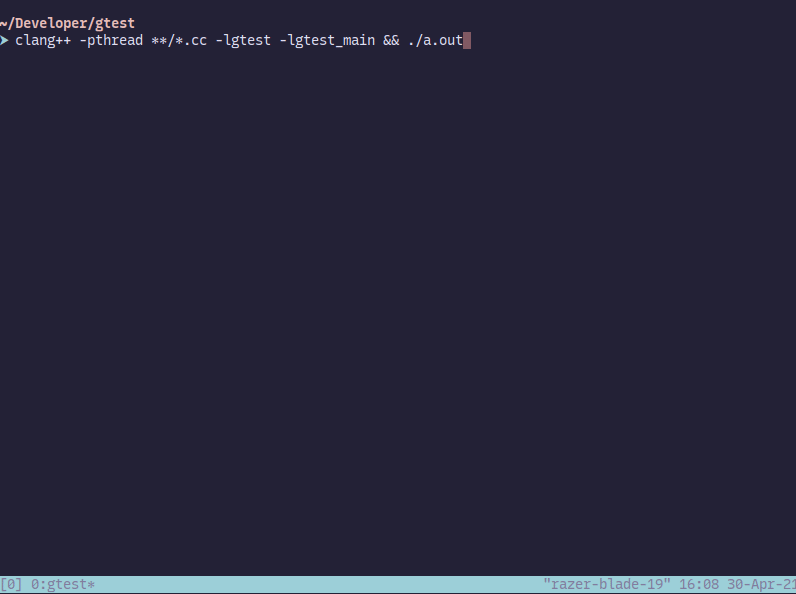Back to basics: using GoogleTest without CMake for C++ projects
April 2021 (457 Words, 3 Minutes)
In this post, I’m going to explain how I went back to basics and used GoogleTest as a standalone library without CMake for small-scale C++ projects.
Table of Contents
GoogleTest
GoogleTest (or GTest) is Google’s testing and mocking framework for C++. GTest can be used for any kind of tests, not just unit tests, and has some nice features like automatically detecting tests and playing nicely with your IDE. It’s generally used with a build system like CMake or Bazel.
You might think I’m a masochist for foregoing a standard setup in favour of programming in VIM and manually linking. Why go back to the basics? It’s good to do things the hard way sometimes and good practice to remember the basics. As a minimalist approach, it also works really well for small-scale projects like the ones I complete for my BSc.
Using the terminal and nothing else, I can avoid the overhead of an IDE and CMake, and as a nice bonus, my directories are decluttered of IDE files. (This is what I do for “fun”, in the workplace I play by the rules and use all the tools!)
Manually Linking against GoogleTest
To manually link against the test framework and produce a test executable that can be run from the command line, do the following:
- The library needs to be in place to link against it, so first install the
libtest-devpackage:
sudo apt install libgtest-dev
- Write the tests, and include the header
<gtest/gtest.h>in the test files. - Compile the tests and link against
-lgtest, and-lgtest_main:
clang++ -pthread **/*.cc -lgtest -lgtest_main && ./a.out
Here’s what it looks like when it runs:

The result is a minimalist one-liner with all the niceties of GTest and no extra overhead.
Stuff that didn’t go to plan
When I first tried to compile the tests, I ran the command without -pthread:
clang++ **/*.cc -lgtest -lgtest_main && ./a.out
This resulted in linker errors and warnings about undefined references to
pthread methods. GTest requires Pthreads to compile, so it seemed like I need
to link against the pthreads library. The internet disagreed, however, on
whether to use -lpthread or the compiler command line option -pthread.
After some digging, I discovered that clang compilers require using -pthread
to both compile and link POSIX-compliant multi-threaded applications. On top of
that, Linux machines should also make use of -pthread, according to the
Linux man pages.
-pthread vs. -lpthread
I went down the rabbit hole to discover the difference between -pthread and
lpthread. Here’s what I learned:
- The
-pthreadoption sets flags for both the compiler preprocessor and linker.- At compile time,
-pthreadmanifests that the Pthread API is requested and defines platform-specific macros, such as_REENTRANTon Linux. - At link time, the linker will specifically link the resultant object against libpthread.
- At compile time,
- In comparison,
-lpthreadwill only do the second part, i.e. linking against libpthread.
Had I not manually linked against GTest, I would not have discovered this, which proves that it’s always a good idea to go back to the basics every now and then!